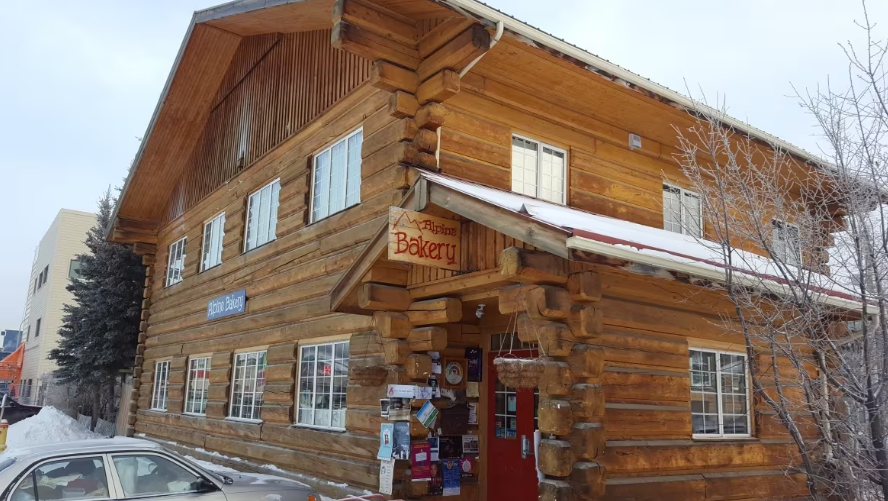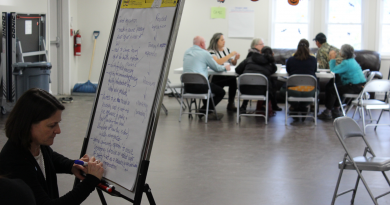Whitehorse’s Alpine Bakery temporarily closing, owners blame nearby emergency shelter

The owners of the Alpine Bakery in Whitehorse say they’re temporarily closing their downtown business because of issues related to the nearby emergency shelter.
The bakery is on the same block as the Whitehorse Emergency Shelter, which opened at 405 Alexander Street in 2017.
Walter and Silvia Streit live above their bakery and says that noise from shelter users has kept them up at night and led to health issues. They also spoke of repeated instances of trespassing and the discovery of needles and drug paraphernalia on the bakery’s patio.
Businesses near the shelter have long complained about noise, garbage, and other visual reminders of poverty, addiction and mental health issues in Whitehorse.
The Streits’ decision to close their business prompted outcry on social media and from other members of the business community in Whitehorse this week, many of whom publicly shared letters of support for the Streits.
Silvia and Walter are originally from Germany. After many visits to the Yukon, they decided to take over the bakery as a retirement project seven years ago.
Silvia, visibly emotional, told CBC News that while the community has been incredibly supportive, the situation with the shelter has simply become too much for them to handle.
“I would really love to say thank you to our loyal customers, to our super support and to our staff. It’s so overwhelming, the whole situation,” Silvia said. “It’s so sad for me to make this decision.”
In an email shared with CBC News, Yukon Premier Ranj Pillai offered to meet with the bakery owners to discuss the situation.
“The temporary closure of Alpine Bakery will be a tremendous loss to your customers, and to the community that has relied on your business for bread, pastries, and coffee for the past several years,” he wrote. “I wish to offer my sincerest apologies.”

Ongoing tensions
This isn’t the first time the Yukon government has pledged to address tensions between shelter users, local businesses, and homeowners.
In 2022, the Council of Yukon First Nations (CYFN) and the Yukon government hired two independent consultants to assess whether the shelter was meeting needs and what steps might be taken to address community impacts.
Those reports, released in May of this year, found that the shelter was providing a critical community service.
Based on data and interviews done with shelter clients, staff, and other community stakeholders, House of Wolf & Associates determined that the shelter saves lives every year, as well as money.
“It saved me from freezing and dying and having to curl up in an alley many times. It saved me from starving,” a shelter client is quoted as saying in the report, titled “A Path Forward.”
But the report also found that concerns around safety and the threat of violence were consistent across all demographics they interviewed.
“It’s a building full of fear,” said Water Streit, speaking of shelter users. “They are frightened and they show up in the bakery, in the backyard, saying ‘can we hide here’ because they say…”
“… ‘it is so violent in front of the shelter we are afraid to wait until dinner is served,'” finished Silvia, nodding. “I feel so sad for those people.”
For the Streits, the report is proof that the shelter has been failing both shelter users and other community members.

Non-profit says changes are coming
Connective, a Vancouver-based non-profit, has been managing the shelter in collaboration with CYFN for less than a year. They took over shelter operations from the Yukon in October 2022.
Alongside a more substantive analysis of long-term challenges and solutions, the “A Path Forward” report suggested specific and concrete short-term goals for the shelter’s operator.
In the four months since the report’s release, Connective spokesperson Kim Pettersen says a number of those recommendations have already been implemented, with more to come.
Both Walter Streit and the report recommend decentralizing some of the shelter’s services to reduce demand at its location on Alexander Street. In response, the shelter has submitted a proposal for an evening meal program that would deliver meals to avoid forcing residents to wait outside the shelter.
In response to requests for more law enforcement and monitoring on the street outside the shelter, the organization says it has been meeting with the RCMP bi-weekly and submitted a proposal to the Yukon Government for a downtown safety outreach initiative.
“We have been working to provide clarity about the purpose and services offered at 405 Alexander so that people can better understand the place it occupies in a much larger and more complex systemic puzzle,” said Pettersen.
She also noted that businesses and local residents may be noticing a more general trend — results of a point-in-time count released last week suggested that homelessness in Whitehorse has risen by as much as 30 per cent in two years.
Silvia and Walter Streit say they may consider their decision to close the bakery if they see some significant changes. They’re going to meet with the premier on Thursday.
But Berns Johnson, who uses the emergency shelter frequently, feels that the more things change, the more they stay the same.
“Come back in ten years and you’ll be asking the same questions,” said Johnson.
“You’re looking at years of liquor sales, racism, colonialism. It’s not going away anytime soon. At the end of the day, they don’t want us here, and we’re here.”
Related stories from around the North:
Canada: Downtown business owners hope report recommendations ease tensions around Whitehorse shelter, CBC News
Finland: Swedish-speaking Finnish women launch their own #metoo campaign, Yle News
United States: Craft space aims to teach Alaska Indigenous women skills — and help beat addiction, Alaska Public Media



